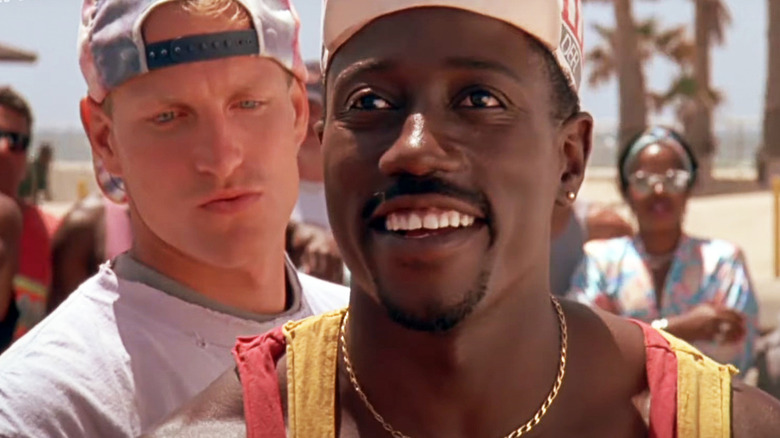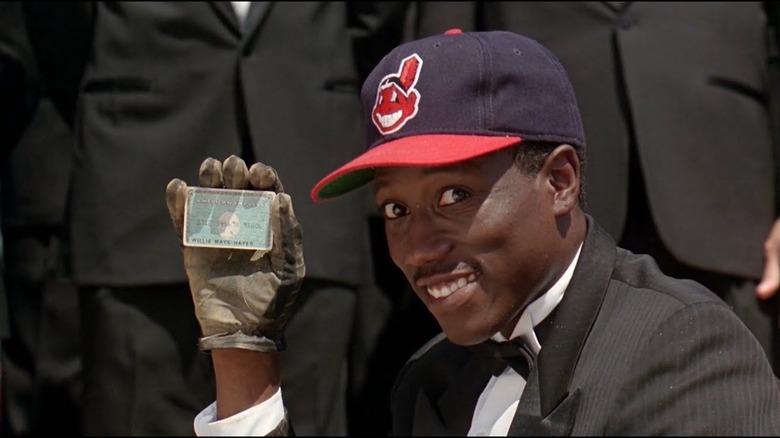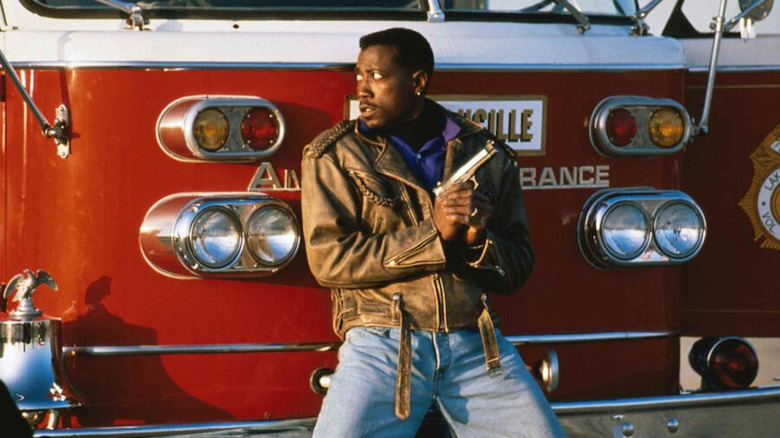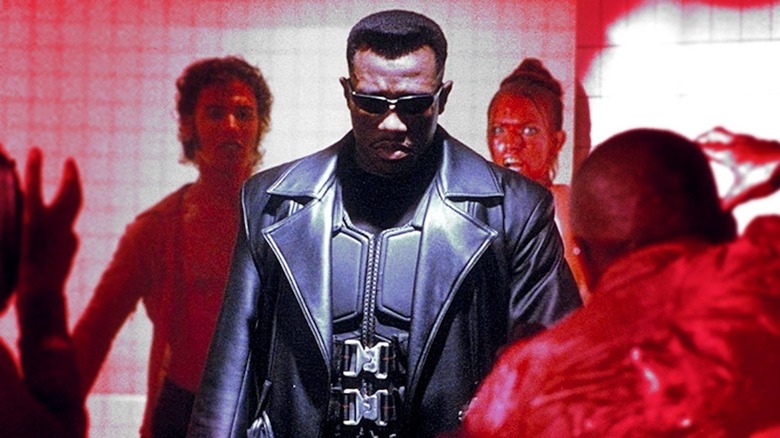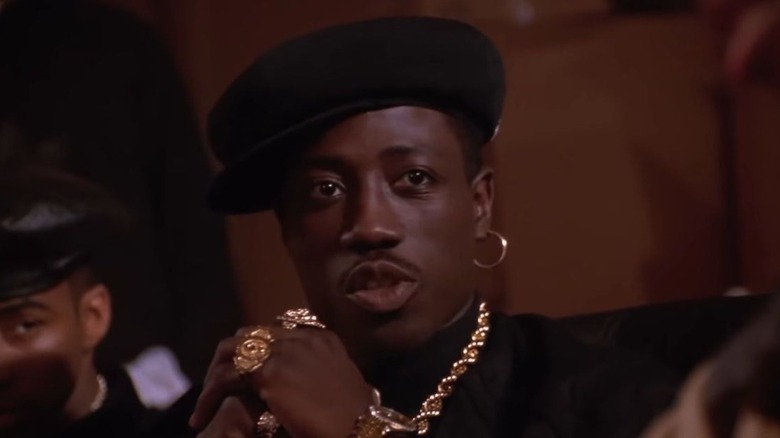Wesley Snipes Is The Best Actor Ever
In 2021, Wesley Snipes used an Esquire "What I've Learned" column to make a fascinating confession: "I've got to learn how to be a movie star."
Snipes was 58 at the time of the article's publication, and enjoying a career renaissance due to his portrayal of actor-director D'Urville Martin in Craig Brewster's uproarious "Dolemite Is My Name." Though he'd officially made his comeback as an aging gang leader in Spike Lee's "Chi-Raq" four years prior, Martin was the perfect vehicle through which Snipes could examine the frustration of an ambitious artist shunted from A-list roles to low-aiming exploitation flicks.
Snipes' Martin is a bitter, alcoholic filmmaker trying, and failing miserably, to make nightclub comic Rudy Ray Moore (Eddie Murphy) look like a Blaxploitation action star on par with Richard Roundtree. Martin is a defeated man, and it's hard not to sense Snipes reckoning with the sun setting on his own action-hero stardom. His delivery of "I see no reason to... do it again" after a particularly inept display of kung-fu — and what a masterful placement of that pause — is the refrain of an artist who knows he's peaked at ignominiously low altitude.
Snipes knows from low. A misdemeanor tax evasion charge knocked him out of movies altogether in 2008. Worst of all, his three-year prison sentence arrived at a moment when the actor was stuck in a direct-to-video rut. Snipes has called that pre-incarceration run "[T]he David Hasselhoff school of business acting." Snipes says he made significant money on those movies, but for cinephiles, losing him to hack-made actioners was a heartbreaker. For two decades, Snipes had successfully bopped between star turns and stirring character work. Regardless of the genre, he was a stick of dynamite that could go off at any moment. That explosion was gone.
Perhaps he really didn't know how to be a movie star.
The breakout
Wesley Snipes knew from jump how to make us love him. He made a striking feature debut as cocky running back Trumaine opposite Goldie Hawn in Michael Ritchie's 1986 high-school football comedy "Wildcats," and worked a subdued variation on the arrogant athlete type as up-and-coming boxer Roland Jenkins in Joe Roth's affecting drama "Streets of Gold." Neither film set the box office on fire, but Hollywood was paying attention. It was just a matter of finding the right parts to exploit Snipes' live-wire charisma, which, in the 1980s, wasn't a sure thing for a young African-American actor.
David S. Ward's "Major League" did not initially appear to be that movie. Paramount sold the baseball flick as a broad, bawdy comedy that eschewed the soulful nuance of Ron Shelton's sleeper hit "Bull Durham," but the film proved to have plenty of underdog heart as it follows a built-to-lose Cleveland Indians (now Guardians) team on an unlikely march to the postseason.
The casting, from Tom Berenger's veteran catcher Jake Taylor to James Gammon's surly manager Lou Brown, is spot-on, but Snipes sizzles as speed-demon, lead-off-hitter Willie Mays Hayes. Hayes crashes training camp, boasting that he "hits like Mays, and runs like Hayes." He comes on like a hustler, but he is, in fact, a terror on the base path (provided he can get there).
Hayes is the most thinly written character of the three leads. He's a trash-talking goofball whose self-confidence turns out to be remarkably well-earned. In someone else's hands — like, say, Omar Epps, who took over as Hayes in the lousy sequel — the character would've been nothing but clichéd bluster. Snipes, however, with his supercharged charm and supernova smile, used Hayes as a springboard to mega-stardom. No one, not even Tom Cruise, could match his blazingly brilliant charisma.
The career
Wesley Snipes threw only strikes over the three years of his career. He dialed it back as dedicated New York City Detective Tommy Flannigan in Abel Ferrara's crime classic "King of New York" and smoldered as ambitious saxophonist Shadow Henderson opposite Cynda Williams in Spike Lee's "Mo Better Blues." In 1991, he went positively James Cagney as crack-dealing kingpin Nino Brown in Mario Van Peebles' "New Jack City," then dropped his magnetism to a tantalizing simmer as philandering architect Flipper Purify for Lee's interracial-romance drama "Jungle Fever."
Snipes' 1992 showed off his full range as an artist and a star: he disappeared into the raw fury and sadness of a paraplegic in Neil Jimenez' "The Waterdance," strutted and squabbled with Woody Harrelson and Rosie Perez in Ron Shelton's streetball comedy "White Men Can't Jump," and, most crucially to his career, hit the big time as a studio action lead in Kevin Hooks' "Passenger 57."
It's at this juncture that Snipes grew less adventurous as an actor. He wasn't coasting per se, but his primary goal seemed to be the reinforcement of his movie-star brand. He's terrific opposite Sean Connery in Philip Kaufman's adaptation of Michael Crichton's deeply problematic "Rising Sun," and an absolute, unhinged gas as madman Simon Phoenix in Marco Brambilla's ingratiatingly silly "Demolition Man." But he sold himself short in middling action movies like "Drop Zone," "Money Train" and "Murder at 1600." Even his portrayal of drag queen Noxeema Jones in "To Wong Foo, Thanks for Everything! Julie Newmar" felt a touch off. Was he getting bored?
Perhaps. Most importantly, he was getting to "Blade."
The career part II
1998 might've been the worst moment to release a comic-book movie. Joel Schumacher had just destroyed the Dark Knight franchise with "Batman & Robin," while Tim Burton's "Superman Lives" had fallen apart late in preproduction. The only bright spot was New Line's adaptation of Todd McFarlane's "Spawn," which performed respectably at the box office despite negative reviews.
New Line and Marvel Studios were eager to bring the latter's beloved characters to cinematic life and saw potential in the action-horror melding of Marv Wolfman's Blade, a black vampire hunter who is a part vampire himself. For the role of the Daywalker, the companies were dreaming big. Stars like Denzel Washington and Laurence Fishburne were discussed, but for screenwriter David S. Goyer, there was only ever one choice. Wesley Snipes had to be Blade.
Up to this point in his career, Snipes was not renowned for his laconic protagonists. He'd backed away just a touch from the rambunctious, fast-talking heroes that shot him to superstardom, but Blade would access a different skill set. That infectious smile was going bye-bye.
While Snipes' segue to action movies had allowed him to show off his bits and pieces of martial arts expertise (which he'd been developing since the age of 12), this would be his first opportunity to flaunt his entire repertoire. In that sense, Blade was a deeply personal character for Snipes. It would also be a showcase of his gift for deadpan quips. I can't imagine another actor outside of Clint Eastwood getting a belly laugh out of "Some motherf***ers are always trying to skate uphill."
Snipes became Blade (to an allegedly combustible extent on "Blade: Trinity"). You could argue it's his defining role. But the Snipes many of us loved temporarily died in the process. Snipes is a man of many moods. And they're all aflame in "New Jack City."
The defining role
Ted Demme's "Yo! MTV Raps" was an instant sensation upon its premiere in 1988. The Bronx-born art form had exploded into the living rooms of suburban white kids across the country, and the subgenre of gangsta rap had proven especially popular with young folks of all colors. Given MTV's unrivaled stature as a driver of pop cultural trends — evinced by the success of everything from "Miami Vice" to "Top Gun" — a flood of hip-hop-flavored movies was inevitable.
Mario Van Peebles' "New Jack City" was the first film to fully capitalize on the strength of street knowledge, and it did so as a meta riff on Brian De Palma's "Scarface," which had become hugely popular in hip-hop circles. Al Pacino's Tony Montana was an invigoratingly vicious bad guy, a man of hideously excessive appetites. This is because he exemplified something deliciously dangerous: a nakedly capitalist monster being inflicted on the wealthy country that created him.
Wesley Snipes' Nino Brown digs "Scarface," but he's also studied corporate America. His crime is hyper-organized. He's not getting over. He's already gotten over.
Ice-T and Judd Nelson play the law-enforcement heroes of "New Jack City," but Snipes is its unabashedly corrupt heart. The man has swagger for days, and verbal dexterity worthy of a Tommy Boy recording contract ("Sit your five-dollar ass down before I make change!"). But Nino isn't a caricature like Montana. He's frighteningly real, and, frankly, we deserve him. Van Peebles' film ends on a moralistic note — because the gangster's always gotta go — but Snipes' electrifying portrayal completely undermines the message. But for a pistol-wielding old man, he was untouchable. He's what our society values: a witty, ruthless captain of industry.
There might never be a more blunt portrayal of American criminality, and that's because there will never be another Wesley Snipes — who knows how to be a goddamn movie star.
